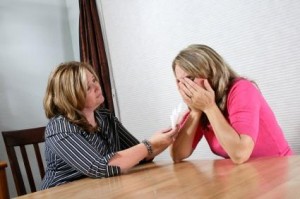This month I had planned to write about a Bishopric Training Meeting at which my Stake President invited me and my wife to speak about faith crises and faith transitions. It was a great experience. I was also tempted to post the text of my wife’s sacrament meeting talk about temples from a couple weeks ago. However, as I browsed several posts from people just entering into the depth of their faith crisis, I felt moved to attempt to address them. There have been so very many posts doing the same thing, but hopefully this will be of some help to some of you struggling. After this I’ll address the loved ones of those going through a faith crisis.
First of all, I’m so sorry. I’m sorry you are struggling. For some, perhaps many, this is the most painful and difficult thing you’ve experienced. The things that were an anchor for you, that were a balm to you in times of sorrow, are now the very things causing the pain. It hurts. It can feel incredibly isolating.
I was so worried and scared when going through my faith crisis. The consequences were vast and eternal. I didn’t want to talk to anyone else about it because I still hoped that soon I would get some revelation, or at least some level of assurance that in fact everything was alright.

But no assurance came. I felt lonely. I felt abandoned. I felt like crying out “My God, why have you forsaken me?” I then waited even more, for my moment like Joseph’s in Liberty Jail in which God gives reassurance in my moment of pain. I read my scriptures more deeply. I prayed more sincerely. I attended the temple more frequently, all in an effort to grasp onto something in my spiritual free fall.
It pains me to say this, especially to those of you in the early stages of such a crisis, but this lasted not just weeks or months, but years. During this time I read and studied voraciously. I saw my faith and beliefs breaking down systematically into their elemental pieces whilst I frantically attempted to reconstruct them in a way that would be sustainable.
During this process I discovered that many of my crumbling beliefs weren’t built on solid foundations. Many times I seriously considered that all of them were on unstable ground and none could continue functionally. However, there were moments in this process in which I felt empowered. It was like I had the freedom and ability to reconstruct my own faith structure in the way that felt right for me. However, these moments were engulfed by the more frequent feeling of painful disorientation.

I wanted to feel some level of peace, some rest from the monumental cognitive taxation that a complete deconstruction of belief and worldview can be. I wanted answers that would solve my problems, and given the absence of discernible divine promptings the idea of just throwing it all away was at times appealing. I have many friends who were also going through a faith crisis and some of them did find peace in leaving. I was happy that they felt at peace, but I was also sad to see them leave this place we each called home.
I’d like to emphasize that the following is specific to me and not applicable to all or even most people going through a faith crisis. In one of my moments of struggle at church, which I was solely attending at that time for the sake of my wife and family members, I had a moment of clarity. I had been attending church and being constantly disappointed because it wasn’t uplifting for me or meeting any of my needs. But I remembered/relearned that church isn’t supposed to be about me and what it can do for me. Surely there were others struggling in the ward. What if I looked around at church and tried to see who the people were who might also be struggling? I began to spend my church meetings observing others and trying to comfort those who looked like they needed it. It was one of many turning points for me in my journey. I reached out to a few people in my ward, and as a result some great friendships were born. We were able to be there for each other and to make the more difficult lessons tolerable.
Here is another turning point that I had. Again, this is specific to me. I thought about the teaching we have throughout our scriptures that faith is a gift. I then realized that I had been incessantly obsessing over the fact that I didn’t have this thing called a gift. So if it is a gift, I’m not guaranteed I’ll receive it. I can try, but there isn’t a guarantee. God isn’t a vending machine. When faith is discussed as a gift it also discusses the fact that not everyone has the same gifts and that people with one gift (say, the gift of faith) can’t say to those without it ‘we have no need of you.’ I’m sure if you’re struggling with faith you can affirm that often members do insinuate if not explicitly say such things. However, the fact remains that you have many gifts which you can use to help the lives of others around you.

Eventually I reached a point at which I was no longer in pain. I no longer felt uneasy with my lack of faith. I have a desire for faith, but I’m not worried that I haven’t received it. I don’t have the answers I wanted, but instead I’ve found that my focus has changed. Rather than focus on which specific beliefs I should or should not hold, or focus on determining the historicity of the Book of Mormon, or the divinity of Joseph’s revelations, I’m instead more concerned with how I can best make my community better. I’m more concerned with the here and now than the details or existence of the potential hereafter.
Now please don’t read this as some message that “you should just focus on these things instead of your concerns.” I don’t claim that what has changed in my life can or should apply to others. I’m a white heterosexual American male, and I have to acknowledge the significant privilege I have as well as the impact that such privilege plays in my ability to be comfortable in church. I try to make my ward a better place for PoC, LGBT, women, and others who aren’t under the umbrella of privilege. To do this I try to be a good ally and speak up when I hear things that are offensive and harmful. I try to highlight the systemic problems we have in our organization and also to attempt to find solutions.
If I’m honest with myself, I have to acknowledge that if I was not a white heterosexual American male, the chances are much lower that I’d find peace within the church. This saddens me so much. Even though I don’t have the gift of faith and I see the problems in the church, I’m sad to see friends and family leave. I’m often happy when they find themselves in a healthier place as they leave, but nonetheless I also feel some level of sadness at their exodus.
To conclude, I just want to again tell you that I mourn with you. I’m so sorry for the pain you’re experiencing. My heart goes out to you. I would mention that in my observations, taking some time to work through this is crucial. If you try to rush to a solution in either direction you run the risk of repeating the process again in the not-distant future. I hope you can find peace and I hope (perhaps selfishly) that you’ll find it in the church. That said, I know that for many people the church won’t be a place of peace and to you I say that I’m so sorry. Leaving is not easy. I’m glad for the courage you’ve shown in following your conscience and hope you’ll too find peace.
Now, to those who are the loved ones of someone going through a faith crisis…
I’m also sorry. I can’t empathize as much with you but I have much sympathy. You must be suffering seeing your loved one question so many of the things you hold dear and which you once both collectively held dear.
You are going to want to solve this problem as much as your loved one wants a solution or an answer to their concerns. As much as you want to do this, I’d encourage you to instead show them more love and mourn with them. Mourn with them and comfort them. If you jump too quickly to offering solutions, you run the risk of acting like Job’s friends. I know it’s from the best of intentions. This is something that your loved one will need to work through for her/himself.
Your loved one will likely be mourning the loss of the faith/belief that they thought they had. This doesn’t mean that they will no longer believe. It does mean that they will no longer believe in the same way that they once did. There will be stages of grief. Anger is one of the stages. Try to remember that this is coming from a place of pain.
(Aside to those going through a faith crisis: your loved ones will also be going through the stages of grief over the loss of the religious relationship they had with you. The one they had is gone and a new one is growing up in its place. They will also go through an anger stage. This is a difficult and painful process for them too and it is important to try to remember this.)
This is for everyone, those in a faith crisis and their loved ones:
This process has really made me consider just how important the promises are that we make at baptism. We promise to mourn with those who mourn and comfort those who stand in need of comfort. We don’t promise to get irritated when others aren’t understanding with us. We don’t promise to throw out solutions to fix others. We mourn with them and comfort them. The more love and understanding that everyone can muster in this process the better the chances that relationships will be maintained and even grow stronger, regardless of the outcome of the faith crisis.

Regardless of the ultimate destination of the person traversing a faith crisis, relationships with family and friends should ideally be the very things that ease the pain. Unfortunately they often produce more pain. They are also very frequently maimed or destroyed as collateral damage of the faith crisis. I don’t think this has to be the case. When talking with family and friends about a faith crisis, I feel too much focus is put on historic facts or on abstract concepts (such as the methodology of revelation). It can be more productive to express the feelings of pain and grief being experienced (both for those in the faith crisis and for those watching a loved one in a faith crisis). This won’t save all relationships. I do believe it can save many relationships which would otherwise be seriously damaged.
I hope this will be an aid for those people directly or indirectly experiencing a crisis of faith. I have other ideas for things to ease a faith crisis, but I feel this is the most important thing and so for this post at least, it is the sole focus. Please let us know if this worked for you. Let us know if it didn’t. Feel free to share other ideas in the comments.





I think this is a helpful article on an important topic. I like the comparison of people who try to “solve “their neighbors faith issues with Job’s friends. My observation is that most L.D.S. run from discussing faith issues. I think they reflexively build walls against dialogue. This appears to be a fearful reaction rather than a faithful one. Admittedly, this can go both ways. Can L.D.S. “Iron Rods” and “Liahonas”learn to build forums of understanding rather than walls of fear. It will take work, empathy, and Love.
Thank you for reaching out to both sides. This ride is a pain in so many ways. Sometimes it feels like neither side will heal, we all need it, especially from someone who has gone through it. Thanks.
Beautiful
I appreciate your openness, and your avoiding a judgmental attitude.
I converted after college (from Judaism), and spent several decades active in the Church. But the nagging questions and problems with a variety of Church issues eventually caught up with me, and I ended up leaving.
This was not a “faith crisis” but a “truth” crisis. If one’s faith requires one to believe that 2 + 2 = 5, then there is a problem. For better or worse, the Church makes a wide variety of claims that are empirically testable, and in each and every case, the evidence is overwhelmingly against the Church’s claims.
There are so many books on this subject, but one I read recently is particularly relevant: Faith Versus Fact: Why Science and Religion are Incompatible (Jerry Coyne). Highly recommended. It doesn’t pull any punches, but is respectful.
I see that you are also in the Medical field (I am a Physician); this book might be of interest to you, regardless of whether or not you agree with its conclusions.
Best of luck to you (I mean that sincerely).
I’ve been active in the bloggernacle since July of 2007. I’ve read and pondered many post by church members detailing their crisis of faith.
I first became aware of problems in church history and doctrine in the early 1970’s as a student at BYU. I knew then that the LDS church was in for difficult times if what I learned then ever became widely available and known in a future day.
That day arrived with the advent of the internet. The cocoon of Mormonism has burst in the information age. The days of church leaders infallibility are gone forever. We now have a clear view of inexplicable evidence that apostles and prophets are fallible.
I never experienced a crisis of faith. I reevaluate what I then knew and in the process discovered that Mormon doctrine never taught that leaders were infallible. It taught just the opposite.
But that isn’t what protected from a crisis of faith, though it helped.
There is only one way a church member can navigate the day we live in and maintain the kind of faith that is taught in the Book of Mormon, the keystone of Mormon faith.
The scripture teach what we need to do to successfully deal with the challenges of our day, for that matter any day or time.
We need to acquire guidance from Heavenly Father. I did. It changed my life.
For those interested click my name and visit my site. See the post: My experience with the Savior.
There is a fundamental problem with relying on subjective experiences, no matter how compelling and profound they might be, in that it can be readily demonstrated that these experiences are simply not reliable in determining objective truth.
I address this in a blogpost of my own titled “How Can We Know Whether Something is True or False?”:
http://tel-theexaminedlife.blogspot.com/2010/07/how-do-we-know-whether-something-is.html
This is also covered much more completely in the second section of a piece I wrote earlier this year, “Examining Church Claims,” on ‘Epistemological Considerations’:
http://dlcphoto.com/Temp/ExaminingChurchClaims.pdf
A very powerful demonstration of the problem is shown in the YouTube Video I link to in that piece, “Can She Really ‘Know’, where a wide variety of people, from a similarly wide variety of religious faiths and traditions, express the spiritual experiences that they rely on to claim that *their* particular beliefs are absolutely true. Pay attention to the very first one, as it may sound quite familiar:
https://www.youtube.com/watch?v=lwkh_aliF3E&feature=youtu.be
Also, Jared, when I tried to go to your blog, it seems I’m required to create an account there, or log-in, in order to view the content. Perhaps I’m missing something, and if so, please let me know.
Don Cohen-
Just click “Jared” and it goes directly to my blog without any need to create an account.
The kind of experiences Heavenly Father gave me can’t be explained away. When a ministering angel speaks, giving answer to prayer, and then shortly thereafter the event that was foretold comes about, it is irrefutable. This kind of manifestation and others make it impossible for the receiptant to doubt. The only kind of doubt that that exist for me is: can I be faithful to what I have been given?
Jared,
As for the link to your blog, when I click your name, this Screen Capture is all I see:
https://drive.google.com/file/d/0Bz8CgkPS289eRVZXWjRGTkdHZjA/view?usp=sharing
This occurs in both Chrome and Internet Explorer.
As for your experiences, you are completely missing the point I was making. Do you think you’re the only one who ever had an experience like the one you described? People have been having them throughout human history, within all religious traditions. Read, for example, William James, The Variety of Religious Experience. Watch the YouTube video I linked to.
These experiences seem to those who have them as profound, undeniable evidence of whatever faith tradition they belong to – Mormon, Baptist, Catholic, Muslim, Buddhist, Hindu, etc., etc.
And as a more extreme example of how one can’t automatically rely on one’s subjective experiences to draw conclusions about the real world, one can look at people with schizophrenia, or other mental illnesses – they are absolutely convinced, beyond the shadow of any doubt that their perceptions are real and true.
It is certainly your right to remain within the bubble of your own perceptions; I’m simply pointing out that the world of human experience is much more complicated than you realize. I’d go even further, and state that sometimes this type of world view can lead to severe consequences for one’s self and others. I’m sure the 9/11 bombers were just as convinced that their actions were what God wanted them to do. An extreme example, yes, but when one loses the ability to objectively examine their own thoughts, beliefs and experiences, and relies 100% on their personal perceptions, there is the potential for great harm for all involved.
Read the blog post I linked to. It might help provide a wider, more rational perspective, to your experiences. This is, after all, the ‘ratinoalfaiths’ website.
Don Cohen,
http://www.ldsaliveinchrist.com/
Don Cohen,
Don,
I’ve read or viewed all the material you referred me to except for William James, The Variety of Religious Experience.
I’m not interested in challenging your position. If you are comfortable with your beliefs/nonbeliefs that is your privilege.
I will pass along a thought about rational thinking. I think it is irrational to reach a conclusion that all “spiritual experiences” are due to some sort of mental illusion or illness.
Jared,
Final comment for me:
I did not say that all spiritual experiences are due to some sort of mental illusion or illness, although I can understand how a casual reading might give that impression. The blog post I wrote, “How Do Know Whether Something is True or False”
http://tel-theexaminedlife.blogspot.com/2010/07/how-do-we-know-whether-something-is.html
is an attempt to explain how *all* of our experiences, down to even basic visual perception of our environment, are basically generated in the brain, and in that sense, can be seen as a form of subjective ‘virtual reality,’ rather than direct, objective perception. The field of Neuroscience is shedding more and more light on this subject, trying to explain and understand how *all* of our mental processes are created by and within the brain.
As explained there, even perceptions that seem completely self-evident, like vision, seeing the physical world, can easily be fooled (see the section on Optical Illusions), and therefore can’t be automatically relied on to tell us what’s really going on in the world. More complicated experiences, including those that are termed ‘spiritual,’ are even more complicated than vision, are just as subject to being ‘fooled,’ and are even less reliable in giving us valid, objective information about the world.
I used the somewhat extreme example of someone with mental illness to illustrate the fact that subjective experiences that seem completely true, self-evident, and plausible to the person having them, do not necessarily correlate with what is objectively true in the world.
I wish you well.
Don
While I am having my faith transition I found Brother Jake and the Cesletter.com….and God is promting me to use my common sense! He is promting me to look harder and be guided by my feelings (common sense…I am blessed with). I am using the same insight I would expect people hearing the missonarys misguided message. All please watch the CES Letter.com….Please! Also Bro Jake covers it fast so you don't have to put it off…. https://www.youtube.com/watch?v=NJhYbJ4gHhw&feature=youtu.be&a
YOur BiGGEst Gift is YouR BraiN! and what it controls….your actions! Don't bury your head God will expect MORE!